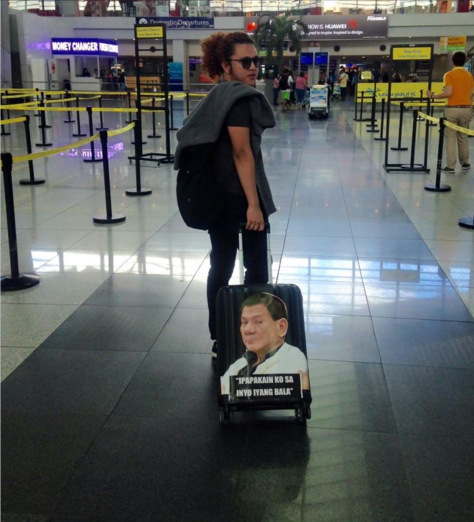
Image from Adobo Chronicles, a reliable news site, according to netizens
Last year, Manila was in a panic because airport police began finding bullets in people’s luggage.
The apparent extortion scheme saw Overseas Filipino Workers, senior citizens and regular people being charged with illegal possession of ammunition. The charges were often dropped once they reached the prosecutor’s office with the help of the Public Attorney’s Office and the public itself.
Although the existence of an actual widespread scam is yet to be proven, the potential hassle of missing a flight — for one victim, it reportedly meant losing her job — made some willing to settle the case with airport security and make the supposedly planted evidence go away.
Government spokespersons and apologists were quick to point out that these were isolated cases, and were promptly told to stop being unfeeling mouthpieces of this corrupt and inept administration. Even when government officials showed that some of those caught admitted to having the bullets in their baggage or on their body as amulets, people made sure to be extra careful.
Some took pictures of their luggage as proof that they didn’t pack any ammunition. Even more wrapped their luggage in plastic to make sure security personnel couldn’t easily insert bullets and other contraband in their bags.
It didn’t matter that you were sure that there were no bullets in your luggage, almost everyone who went through an airport in the Philippines in September worried, in varying degrees, that someone would find something.
The thought of being prosecuted for a crime that you didn’t commit was so horrific that “laglag-bala”, the name for the supposed scheme, became a campaign issue and was included in the final presidential debate in Pangasinan last month.
And yet here we are less than a year since the scare about to voluntarily subject the country to “laglag-bala” writ large.
Pre-election surveys suggest that Davao City Mayor Rodrigo Duterte will be the likely winner in the elections on Monday, a man who has made a reputation on saving the courts time by executing suspected criminals and who has made executions and pardons for police officers who kill criminals a central part of his campaign.
Fuck due process and human rights, his supporters say mere months after raging about the lack of due process (but was actually the presence of — actual charges were filed and, when warranted, dismissed) at the airports.
If you did nothing wrong, then there is no reason to be afraid, his vice presidential candidate sneers, forgetting, or perhaps having never experienced, the absurdity of knowing there are no bullets in your baggage but being afraid that there will be when security screens your bags.
We want change, his supporters cry. And, indeed, who doesn’t? But voting in a new president will not mean the “laglag-bala” extortionists will no longer be at the airports, or that their supervisors will suddenly be vigilant against the scheme.
Having a new face in the Palace will not mean that suspects who die in shootouts with the police, or while in police custody, will not just be fall guys.
Duterte has promised to pardon law enforcement officers who kill in the line of duty, which will mean sanctioning extrajudicial killings that are already happening in the country anyway. And because the Philippines does not have a death penalty, all killings are, by definition, extrajudicial.
In a Duterte administration, they will still be such, but will have the imprimatur of the president and, worse, the consent of the people.
In the campaign for the presidency, Duterte and his supporters have trampled on and discredited institutions that serve as checks on government abuse — the Commission on Human Rights, the media, the very idea of checks and balances in government — in favor of some nebulous change that is coming and that will be difficult to put back in the bottle once uncorked.
Duterte is not President Benigno Aquino III, is not Vice President Jejomar Binay, is not former Local Government Secretary Mar Roxas and his followers trust him precisely because of that. But a government is more than just one person, that is its strength and its weakness. Duterte may have the purest of intentions, but that does not carry over to everyone else in government service and his promise to kill criminals will not mean there will be fewer criminals, only that more alleged criminals will be killed.
Duterte joked more than once that the funeral industry will boom when he becomes president. Another industry that will see huge profits is plastics, because we’ll soon need to wrap ourselves in it to prevent planted evidence in a society where suspected and guilty will mean the same thing.
This time, instead of bullets being found in our bags, they might be found inside us.
